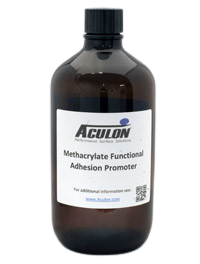Methacrylate Functional Adhesion Promoter
- Enhances the adhesive capabilities of a surface
- 2-4 nm thickness
- Can be used as an additive
Product Description
Aculon, a proven supplier of industrial-grade coatings, introduces their patented Methacrylate Functional Adhesion Promoter. Aculon's Methacrylate Functional Adhesion Promoter is a nano-scale (2-4 nm) surface treatment capable of increasing the adhesion of most metal surfaces. It can be applied directly to the product or via most traditional coating processes, including dip, wipe, or spray.
The Methacrylate Functional Adhesion Promoter is easy to apply and can solve problematic adhesion issues with coatings that cross-link with acrylic functional groups for example, (meth)acrylate, amine, and thiol-based coatings. Also, their actives can be blended into existing formulations for increased surface adhesion of coatings and adhesives.
Advantages of Aculon's Methacrylate Functional Adhesion Promoter
- Improved adhesion strength of paints/coatings on
metal surfaces - Uniform Thicknesses at the Nanoscale
- 100% transmission for Visible Light
- Minimal Capital Equipment Requirements
- Does not leach
Technical Specifications
| General Properties | |||||
| |||||
| Solids | 98 % | ||||
| Electrical Properties | |||||
| Visible Light Transmission | 100 % | ||||
| Other Properties | |||||
| Coating Thickness | 2-4 nm | ||||
Additional Information
How to apply the Methacrylate Functional Adhesion Promoter
STEP 1 ⇨ CLEAN | STEP 2 ⇨ TREAT | STEP 3 ⇨ DRY |
Parts must be sufficiently clean before treatment for proper bonding and effective application. To clean, solvents or soap and water can be used to degrease the substrate.
| Spray - Spray the solution onto the substrate using double passes. | If curing is necessary (short dip times are used), the treated substrates are best cured at 120⁰C peak metal temperature for approximately 30 seconds. For silicon and titanium oxides, lengthening the cure time
|
Dip - Fully immerse the part in the treatment solution for 5 minutes. To decrease the dip time, post-cure is recommended for optimal performance. | ||
Dip with Sonification - Completely submerge the substrate in the solution and sonicate for five minutes. Then remove the substrate and allow it to air dry. |
Application Tips
- For spray application, post-application curing is recommended for best performance.
- Coat the substrate as soon as possible after cleaning to prevent recontamination.
- Spray Equipment Suggestions: HVLP(Binks Mach 1), HVLP(Devilbiss JGHV), Air Atomization(Devilbiss MBC gun), and Airless(Graco Model 225-292 President Pump Series A).
- Cure temperatures and conditions should be optimized based on substrate and durability requirements.
- Clean all equipment with alcohol (e.g., Isopropanol) or the solvent used.
- If a UV-curable coating system is being used, then it may be necessary to modify the curing parameters to ensure sufficient radical generation near the surface of the monolayer to achieve optimal adhesion.
Application Ideas
- Use to improve lead-frame adhesion in many electronics applications
- Improved bonding of an epoxy over-mold compound
- Prevent delamination of finished products
- Improved adhesion of UV-cured coatings
- For coatings that cross-link with hydroxyl functional groups, Hydroxyl Functional Adhesion Promoter is a better fit.




